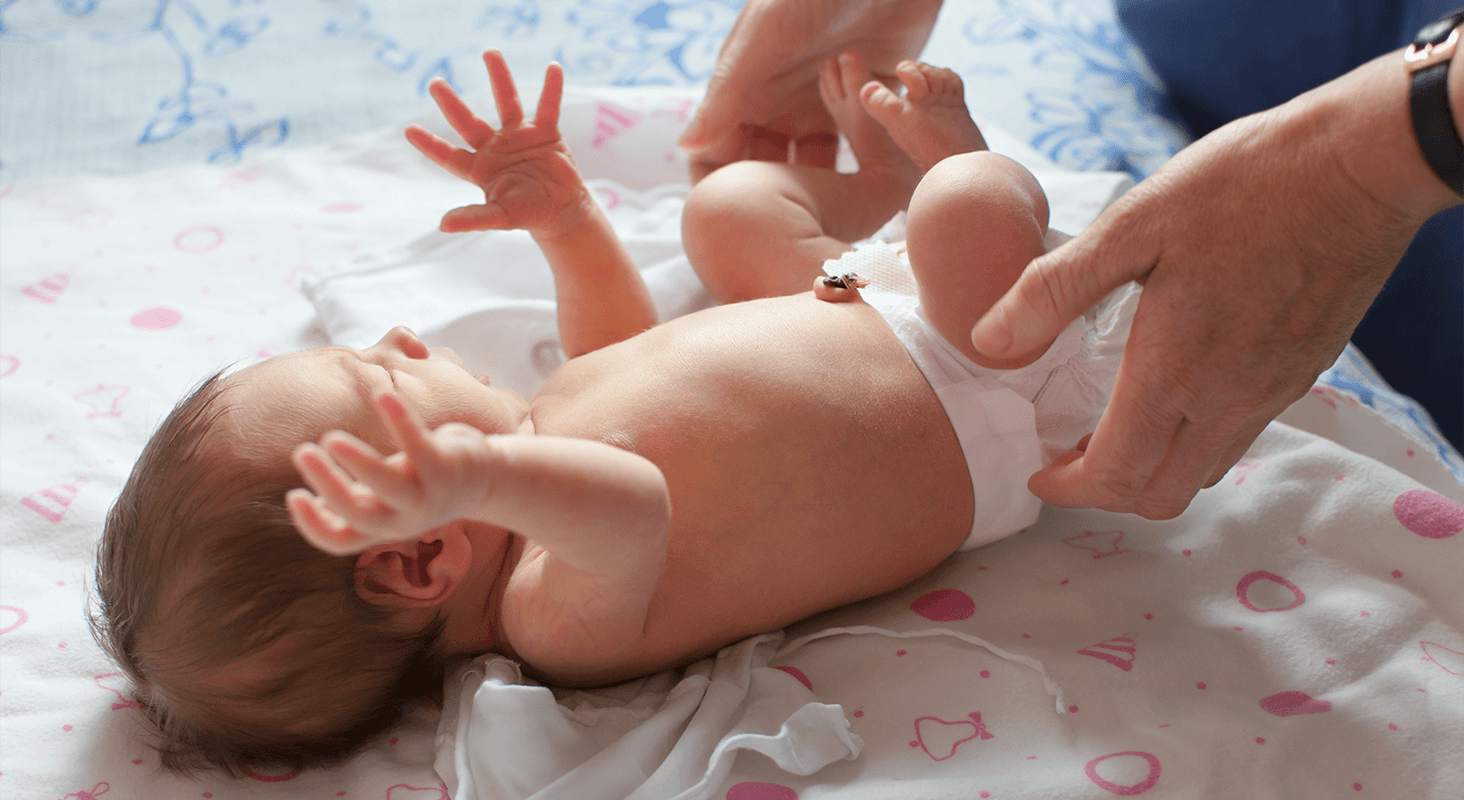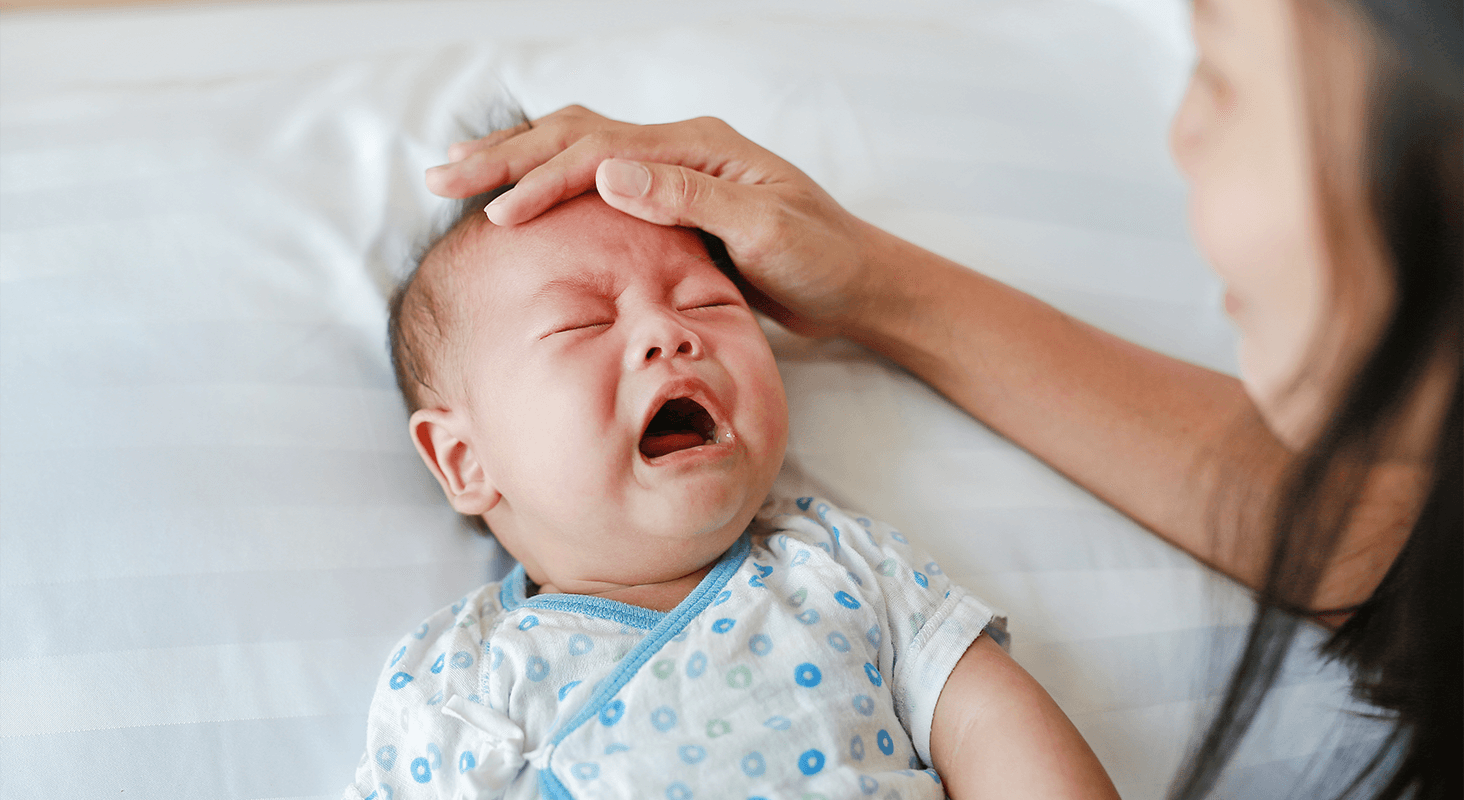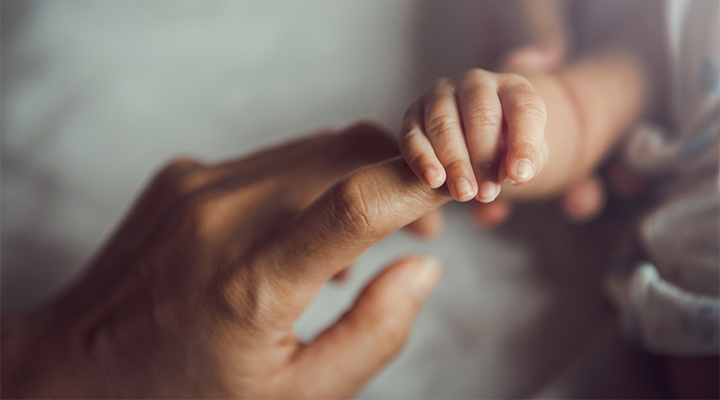Common Newborn Health Issues
New parents have a lot of questions. How should I care for their belly button? When does excessive crying become colic? Here are some answers to common issues you may encounter.

My baby spits up all the time. What should I do?
- Half of all infants “spit up” or have reflux. Reflux is not forceful vomiting—it is milk coming out of the baby's nose/mouth, often with a burp, and does not affect your baby's growth or development.
- Most babies stop spitting up by their first birthday.
- It can help to:
- Make sure you aren't over-feeding your baby. For more info, read our guidance feeding your newborn.
- Burp your baby during and after feeds.
- Keep your baby upright for 20 to 30 minutes after they eat.
CALL YOUR BABY'S DOCTOR IF:
Your baby is throwing up forcefully or if the vomit is yellow, green, bloody, or looks like it has coffee grounds in it.
What are these bumps or spots on my baby's skin?
- When babies are born, they often have a white, creamy substance called “vernix” on their skin. This protects their skin before they're born and comes off with their first bath.
- Many babies have skin that is dry or peeling, especially for the first few weeks. Babies don't need skin creams or lotions, but if you choose to use one, make sure it is specially designed for infant skin.
- Babies do not need to be bathed every day. Use unscented infant cleanser/shampoo for baths.
- It's common for babies to have red patches on their forehead or neck. Many also have gray/blue skin patches on their bodies, especially on their buttocks. These are normal and usually fade with time.
- It is very common for babies to develop skin rashes over the first few days of life. Most of these are harmless.
- Blotchy red spots called “erythema toxicum” begin in the first couple days of life. These spots come and go but usually resolve within two weeks.
- Babies often have tiny white bumps called “milia” when they are born, especially on their nose, chin, and cheeks. These usually go away within several weeks.
- Small, fluid-filled bumps that open and leave a dark spot are called “pustular melanosis.” Babies are sometimes born with these bumps or develop them a few days after their birth. These can form anywhere on the body and usually go away within a few months.
CALL YOUR BABY'S DOCTOR IF:
Your baby has red/purple dots on their body or if the rash is blistering, oozing, or crusting. This could be a sign of a very serious infection.

How do I care for my baby's belly button?
GENERAL CARE
- Your baby's umbilical cord stump will dry up and turn black over the first few days.
- You do not need to apply alcohol to the cord.
- Wait until the stump falls off before you give your baby their first bath.
- If the umbilical stump gets wet, gently dry it off.
- Fold your baby's diapers when you are putting them on so the edge doesn't rub against the umbilical stump.
WHAT TO EXPECT
- The stump will usually separate and come off within three weeks. It's normal for there to be a few drops of blood when it falls off.
- The base of the belly button is often moist for a few days after the stump comes off. This should dry within a couple days.
- If the skin around the belly button becomes red or tender, or if there is bad smelling from the area, this could be an infection. Tell your baby's doctor right away.
- Sometimes there is a small, moist lump of tissue at the base of the belly button after the stump separates. This may drain a little yellow liquid. This is not serious, but tell your baby's doctor if it does not go away after a few days.
- Sometimes the belly button area can bulge when your baby cries, poops, or even rests. This may be an umbilical hernia. You don't need to worry about it unless it becomes red or tender. Do not put tape, coins, or wraps over the hernia—these can cause rashes and don't help the hernia go away any faster.
How do I care for my baby's penis?
UNCIRCUMCISED
- Clean/bathe with soap and water, just like the rest of your baby's skin.
- You don't need to try to retract or pull back the foreskin in a young baby.
- Tell your baby's doctor if your baby seems uncomfortable when he pees.
CIRCUMCISED
- For the first few days after circumcision, your baby's penis will look very red or even purplish, and it may also have a white/yellow material where the circumcision was done. Both should get better within a week. During that time, put a piece of gauze with Vaseline over your baby's penis so the diaper does not get stuck to the healing skin. When you change your baby's diaper, also change this piece of gauze.
- Clean the penis gently with soap and water as needed during diaper changes.
- Tell your baby's doctor if the redness worsens, if the penis becomes more swollen or painful, or if you are worried that the area has become infected.
My baby has not pooped in a couple of days. Is he constipated?
Some babies poop every time they feed, others can go up to three to four days without pooping! Constipation is when a baby's poop is hard, like little pellets. If your baby's poop is soft, they are not constipated, even if they are not pooping every day.
It is common for babies to strain and make noises when they are trying to poop, especially if it's been a few days. Bicycle kicks, belly massages, and warm baths can help.
CALL YOUR BABY'S DOCTOR IF:
- Your baby's poop is firm or has blood in it.
- Your baby is vomiting forcefully.
- Your baby's belly is puffed out (distended).

How do I know if my baby has colic?
WHAT IS COLIC
- Colic is when a healthy baby cries more intensely, frequently, or for longer periods of time than usual. A baby with colic cries for three or more hours a day ON three or more days a week for three or more weeks.
- All newborns cry, and babies cry the most when they're about 6 weeks old but usually much less by 3 to 4 months. See our guidance on crying for more info.
- Colic is not caused by the parent. If your baby has colic, it's not your fault!
HOW TO HELP
- There are no medicines that help colic. Gas drops, gripe water, and other medicines will not make colic go away any sooner.
- Colic can make parents feel frustrated and even angry, especially when they are tired! Remember to take a few minutes for yourself. If you can, ask for help from your partner, family, or friends.
- The “5 S's” can help!
- Swaddling
- Side/Stomach position—but only while supervised by an adult!
- Shushing noises
- Swinging/Swaying
- Sucking
WHO TO CALL
The Fussy Baby Network is a great resource for parents of colicky babies. You can call them at 888-431-2229.
Additional Reading
Going Home With Baby
Here's what to know about the first few days after coming home from the hospital.
When to Call the Doctor
Some of the most common illnesses babies face, and when you should give the doctor a call.
Crying
Understand why babies cry, how you can soothe them, and when to call for extra help.
